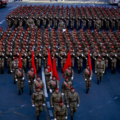As Argentina begins a week of national mourning, the death of Pope Francis has struck a deeply emotional chord across the country he once called home—but never returned to as pontiff.
Jorge Mario Bergoglio, the former Archbishop of Buenos Aires, left Argentina in 2013 to participate in the papal conclave in Vatican City. Few imagined he would emerge as the successor to Pope Benedict XVI—and fewer still believed that would be the last time he would set foot in his homeland.
On Monday, current Archbishop of Buenos Aires Jorge Ignacio García Cuerva spoke candidly about the void left behind. “We are orphans of a father who profoundly loved his country,” he said, “but had to learn to become the father of the whole world.”

Bergoglio’s ascension to the papacy took many by surprise. At 76, he was already a year past the age most bishops tender their resignation. According to Guillermo Marcó, a priest from the Buenos Aires Archdiocese, the future pope had been preparing for retirement in a modest room in the capital’s Flores district. “He seemed sad when he left for Rome,” Marcó recalled in an interview with Clarín. “No one expected this.”
The unexpected papacy would last 12 years, during which Pope Francis became a global symbol of humility and simplicity. Yet, for many Argentines, his absence at home created a lingering sense of emotional distance. Elenir Ramazol, a nun attending a candlelight vigil at Buenos Aires cathedral, described it as a sign of total devotion. “He gave himself entirely to the Church. Not just to us, but to the whole world,” she told BBC Mundo.
Despite never returning, Francis stayed closely connected with Argentina. Gustavo Vera, an old friend and leader of the anti-trafficking group La Alameda, exchanged hundreds of letters with him. “He followed news in Argentina in detail—soccer, tango, politics,” Vera said.

During his papacy, he visited four of the five countries bordering Argentina—but never Argentina itself. His decision disappointed some, especially as the country faced economic collapse in recent years, with inflation nearing 300% and poverty on the rise.
According to Vera, the pope’s absence was strategic. “He wanted to avoid being politicized. He said he’d come when he could help unite the nation,” Vera explained. That unity has remained elusive, with Argentina divided by decades of political rivalry—particularly over the legacy of Peronism.
The perception that Francis leaned toward Peronist ideals fueled criticism from conservatives, especially after his remark in a 2023 book: “If we had a Peronist conception of politics, what would be wrong with that?” The comment added fuel to detractors who accused him of aligning with left-wing causes.

President Javier Milei, who once referred to the pope as “the embodiment of evil,” later softened his rhetoric after taking office. The two held a respectful meeting in the Vatican, and Milei extended an official invitation for a homecoming visit that would never happen. Following Francis’ death, the president issued a heartfelt tribute, praising his wisdom and compassion.
The pontiff’s complicated legacy in Argentina reflects both admiration and disillusionment. According to Pew Research, approval ratings in his homeland dropped from 91% in 2013 to 64% in 2024—the steepest decline among six Latin American nations surveyed.

Still, many Argentines continue to mourn him as a spiritual father. Alejandra Castro, a social worker attending the vigil, expressed the sentiments of many: “Argentina was always in his prayers. He never forgot us.”
Vera offered a final reflection: “Rather than blaming Francis, maybe we Argentines should ask ourselves what we did—or didn’t do—that meant we didn’t deserve his visit.”
In death, as in life, Pope Francis leaves behind a legacy that transcends borders. But in Argentina, his absence leaves a nation searching for closure, and grappling with the sense that its most famous son belonged, in the end, to the world.







